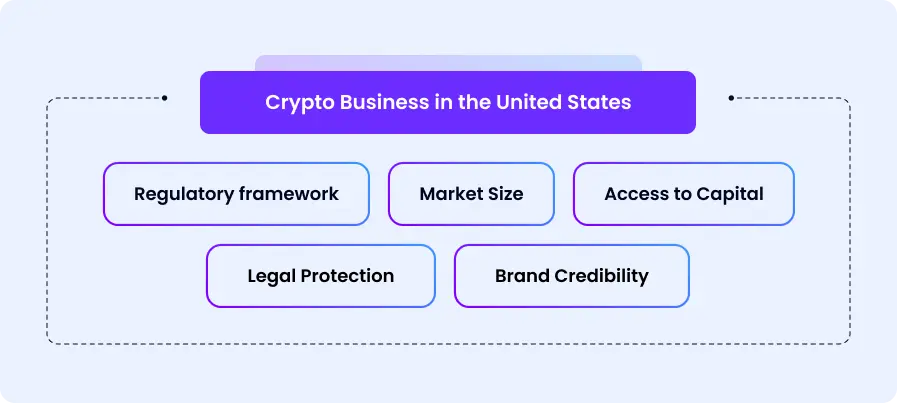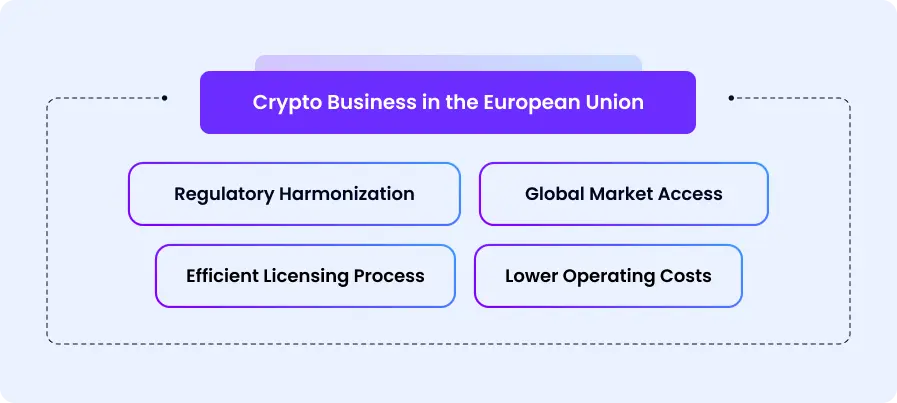Launching Crypto Business In EU Vs. US: Ultimate Guide
To launch a cryptocurrency business in 2024, you must first determine your primary jurisdiction. Selecting the proper jurisdiction for your operations is not a trivial matter. Various elements, such as cryptocurrency rules and tax checks, will help you make this decision.
Entrepreneurs and crypto companies are searching for jurisdictions with appealing functions. Two good options are the European Union and the United States. In this article, we will delve into these two areas, analysing the advantages and barriers they present. We will also provide you with insights on how to efficiently navigate the regulatory framework for establishing and running a thriving cryptocurrency commercial enterprise.
Ever since its launch in 2009, Bitcoin has revolutionized the world of cryptocurrency, evolving from a niche group to a widespread phenomenon embraced by individuals all over the world. With its initial success, Bitcoin has also inspired the creation of numerous other cryptocurrencies, each offering unique attributes and promising various potential uses.
However, as the world of cryptocurrency continues to expand and develop at a staggering pace, the choice of jurisdiction is equally important. Each country has its own set of regulations, with far-reaching effects on factors like taxes, legal structures, and safeguarding of investors. This is why thoroughly considering and selecting a jurisdiction that offers clarity and support for crypto-related activities is imperative.
When evaluating jurisdictional options, it's important to consider certain factors, such as regulatory maturity, cost of operations, available talent pool, and the global reputation of the jurisdiction.
Crypto Business in the United States
Regulatory framework. Regarding the regulatory framework, it's worth noting that the United States Securities and Exchange Commission (SEC) categorises certain cryptocurrencies as commodities instead of securities. This distinction provides businesses with a greater sense of certainty.
Market Size. The market size in the US is substantial, thanks to its large and diverse population, which includes a significant number of cryptocurrency users and investors
Access to Capital. When it comes to accessing capital, firms in the US offering crypto assets are fortunate to have a range of funding sources at their disposal. Prominent venture capital firms such as Andreessen Horowitz and Union Square Ventures are a couple of examples.
Legal Protection. US-based crypto businesses enjoy the advantage of legal protections offered by federal and state laws.
Brand Credibility. Investors and users tend to view US-based crypto firms as more credible and trustworthy. This is because the country's regulatory environment imposes strict standards to ensure compliance and prevent money laundering.

Crypto business in the European Union
Regulatory Harmonization. The European crypto regulations aim to harmonize standards across member states, providing clarity and consistency for businesses operating in multiple countries within the EU.
Global Market Access. Most EU crypto licenses permit businesses to operate globally, enabling access to a large and diverse market beyond EU borders.
Efficient Licensing Process. Obtaining necessary licenses in the EU is typically efficient, with an average processing time of 30 - 60 days, reducing bureaucratic hurdles for market entry.
Lower Operating Costs. The cost of transactions in crypto assets, including legal fees and capital requirements, are generally lower compared to the US, making it more cost-effective to establish and operate a crypto business in the EU.
Consumer Trust: EU regulations prioritize consumer protection and data privacy, enhancing trust and credibility for businesses in the region.

Differences in EU and US requirements
|
Criterion |
United States |
European Union |
|---|---|---|
|
Regulatory Framework |
SEC, CFTC, and FinCEN |
MiCA, AMLD5 |
|
AML/KYC Compliance |
Mandatory |
Mandatory |
|
Licensing |
Money Transmitter License, BitLicense (New York only) |
Some countries require a crypto license |
|
Registration |
Register with agencies, such as the SEC, CFTC, and FinCEN |
Register with local financial authorities. |
|
Data protection and privacy |
State and federal laws (e.g., CCPA) |
GDPR compliance |
|
Taxation |
Categorised as property by the IRS (Internal Revenue Service), |
Varies among EU member states |
|
Security Token Offerings (STOs) |
Heavily regulated; SEC approval often needed. |
Regulated like traditional financial assets |
|
Initial Coin Offerings (ICOs) |
Subject to federal securities laws |
Generally less regulated |
|
Cross-border operations |
State-by-state licensing can make this complex. |
Easier due to harmonized regulations |
|
Cost of Operation |
Generally higher due to compliance and legal fees. |
Generally, lower costs |
US Vs. EU: Time, Costs, and Complexity
The time, difficulty, and financial levels for launching a crypto project differ between the United States and the European Union.
Time
US: The process tends to be more prolonged and strict, often taking anywhere from 6 months to a year.
EU: Depending on the state within the EU, the approval process may be faster, often taking anywhere between 30 to 60 days.
Complexity
US: The regulatory environment is often stricter.
EU: The regulatory environment in the EU is more lenient.
Costs
US: Costs are higher because of strict regulations and higher legal fees.
EU: Costs are generally lower.
Specific EU Countries Favourable for Crypto Business
Estonia pioneers cryptocurrency regulation with an efficient licensing process and low fees, fostering a favorable business environment. Also, Estonia's tax policies, including no income tax and VAT exemption for cryptocurrencies, further enhance its appeal for crypto ventures.
Poland appeals to crypto firms because the registration is straightforward and quick.
Lithuania offers a straightforward licensing process for cryptocurrency businesses. Additionally, its strategic location, situated in the Baltic region offers access to both EU and non-EU markets, making it an attractive destination for crypto startups looking to expand their reach globally.
How to Launch a Cryptocurrency Project in the US or EU
If you are looking to launch a crypto project right now, then follow the following steps.
Market Research and Compliance Analysis.
- Conduct thorough market research to understand the demand, competition, and regulatory landscape in your target region.
- Analyze regulatory requirements and compliance obligations specific to crypto projects in the chosen jurisdiction (e.g., licensing, AML/KYC regulations, tax implications).
Business Planning and Strategy Development.
- Develop a detailed business plan outlining your project's goals, target audience, revenue model, and growth strategy.
- Define your project's unique value proposition and positioning within the market, considering factors such as innovation, security, and user experience.
Legal and Regulatory Setup.
- Identify the appropriate legal structure for your crypto project (e.g., corporation, LLC) based on factors like liability protection and tax implications.
- Obtain the necessary licenses and permits required to operate legally in your target jurisdiction, ensuring compliance with relevant regulations and guidelines.
Technology Infrastructure and Security Implementation.
- Establish relationships with banks or financial institutions such as the European banking authority to help in acquiring crypto assets services, including a crypto trading platform, wallets, and security measures.
- Implement robust security protocols to safeguard user funds and data, such as encryption, multi-factor authentication, and regular security audits.
Launch and Marketing Execution.
- Prepare for the official launch of your project, including beta testing, user onboarding, and customer support setup.
- Develop and execute a comprehensive marketing strategy to promote your project. Afterwards, constantly monitor your business and beware of market manipulations.
White Label Solutions
As seen above, the process of launching a crypto project can be rigorous. Employing white-label solutions to help you navigate this tedious process is a great alternative. Our solutions are ready to work in any regulation, we also offer licensing advice to our clients.
FAQs
Q1. Why is choosing the right jurisdiction crucial for launching a crypto project?
Choosing the right jurisdiction is crucial for launching a crypto project because the regulations and laws surrounding cryptocurrencies vary significantly by jurisdiction. These differences can greatly impact the legality, tax implications, and overall success of a crypto project.
Q2. How can white-label solutions simplify the process of launching a crypto project?
White-label solutions simplify the process of launching a crypto project by providing customizable and branded pre-built software tailored to the project's specific needs. This eliminates the time and resources required to develop a cryptocurrency exchange or wallet from scratch. Additionally, white-label solutions often come with built-in features and functionality, saving further development time and costs.
Q3. What challenges and opportunities exist in the cryptocurrency landscape?
Some challenges include regulatory uncertainty, security risks, and market volatility. However, there are also opportunities for innovation, financial inclusion, and decentralized systems. As technology continues to evolve, businesses and individuals need to stay informed and adapt to these changes to navigate the cryptocurrency landscape successfully.



